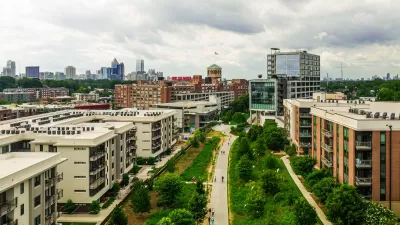The redevelopment plan for the "Gulch" site could have created a potential Amazon headquarters location, but it's been tabled over concern about the return on the city's investment.

"Mayor Keisha Lance Bottoms on Monday said she would not push the City Council to vote on her proposal to provide up to $1.75 billion in public financing to help redevelop downtown’s Gulch," reports Stephen Deere.
California-based CIM group has proposed a $5 billion development plan for the site, adjacent to the Five Points MARTA station and Mercedes Benz Stadium.
"The development has been pitched as a possible home for Amazon’s second headquarters, but city council members questioned whether the public would benefit enough for taxpayers to give up nearly $2 billion in incentives," according to Deere.
The development deal appeared headed for a vote by the Atlanta City Council on Monday, September 17, until Mayor Bottoms tabled the vote for lack of votes. According to a separate article by Sonam Vashi, discontent with the plan centered on the affordable housing components. In exchange for the $1.75 billion in tax incentives proposed as part of the deal, CIM was proposing $28 million for a citywide affordable housing trust fund, 200 units of housing affordable to residents making 80 percent of the area media income, and a commitment to "rent 10 percent of its units for people making very low incomes (30 percent of the area median income, or $520 for a two-bedroom) — if it’s paid for with housing vouchers from the city or federal government," according to Vashi.
Still, critics of the plan say that return wasn't enough to warrant the size of the tax break.
For more on the details of the redevelopment proposal, see previous coverage by Scott Trubey, Josh Green, and Sean Keenan.
FULL STORY: Lacking votes, ATL’s $5 billion gulch project delayed

Maui's Vacation Rental Debate Turns Ugly
Verbal attacks, misinformation campaigns and fistfights plague a high-stakes debate to convert thousands of vacation rentals into long-term housing.

Planetizen Federal Action Tracker
A weekly monitor of how Trump’s orders and actions are impacting planners and planning in America.

In Urban Planning, AI Prompting Could be the New Design Thinking
Creativity has long been key to great urban design. What if we see AI as our new creative partner?

King County Supportive Housing Program Offers Hope for Unhoused Residents
The county is taking a ‘Housing First’ approach that prioritizes getting people into housing, then offering wraparound supportive services.

Researchers Use AI to Get Clearer Picture of US Housing
Analysts are using artificial intelligence to supercharge their research by allowing them to comb through data faster. Though these AI tools can be error prone, they save time and housing researchers are optimistic about the future.

Making Shared Micromobility More Inclusive
Cities and shared mobility system operators can do more to include people with disabilities in planning and operations, per a new report.
Urban Design for Planners 1: Software Tools
This six-course series explores essential urban design concepts using open source software and equips planners with the tools they need to participate fully in the urban design process.
Planning for Universal Design
Learn the tools for implementing Universal Design in planning regulations.
planning NEXT
Appalachian Highlands Housing Partners
Mpact (founded as Rail~Volution)
City of Camden Redevelopment Agency
City of Astoria
City of Portland
City of Laramie





























